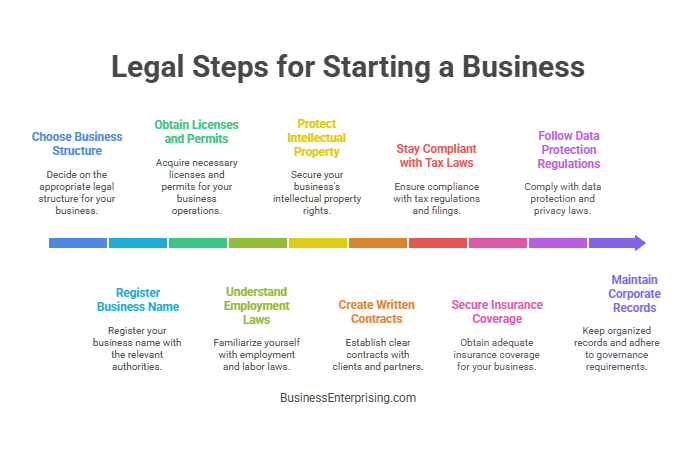
Additionally, legal planning helps you avoid unnecessary risk. For example, registering your business name protects your brand. Creating contracts puts expectations in writing. Therefore, these steps make your business easier to manage as it grows. They also help you avoid disputes that could damage your reputation.
However, many new business owners overlook legal details. That can lead to problems with taxes, compliance, or employment laws. These mistakes are often expensive and time-consuming to fix. By thinking about them ahead of time, you can avoid the stress later. Additionally, clear legal planning shows others that your business is professional and reliable.
Your legal setup doesn’t need to be complicated. However, it does need to match your business goals. The steps you take now can make a big difference later. Therefore, it’s worth taking time to get things right. With a solid legal foundation, you can focus on growth and serving your customers.
Choosing the Right Business Structure
Choosing the right business structure is one of the most important legal considerations for starting a business. Your choice directly affects how much you pay in taxes, your personal liability, and how much paperwork you’ll need to manage. Each structure offers different legal protections and responsibilities, so it’s smart to weigh your options early on.
If you start as a sole proprietorship, the setup is simple. However, you’ll be personally responsible for any business debts. That means your personal assets could be at risk. A partnership is similar in that regard, but the responsibilities are shared between partners. You’ll want a written agreement to reduce confusion and disputes later.
On the other hand, forming a Limited Liability Company, or LLC, gives you liability protection. This separates your personal finances from your business. Additionally, LLCs offer flexible tax options. You can choose how you want to be taxed, which can make a big difference at tax time.
Corporations offer the strongest legal protection. They are more complex and often used by businesses planning to grow or seek outside funding. However, they come with strict compliance rules. You’ll have to hold meetings, file reports, and keep detailed records.
Therefore, you should think about your long-term plans when choosing a structure. Additionally, it helps to consider how much legal complexity you’re willing to manage. While it may be tempting to go with the easiest option, it could cost you more later. By understanding the pros and cons of each type, you can make an informed decision. This will help you protect your business from legal and financial headaches down the road.
Registering Your Business Name
Registering your business name is one of the first legal steps you’ll need to take. It signals that your business exists. More importantly, it helps prevent other businesses from using the same or a similar name. That’s one of the earliest legal considerations for starting a business.
First, you should start by doing a name search. This helps you avoid choosing a name already used by another business in your state. Additionally, you want to make sure the name is available for a website domain. After that, you can move forward with confidence.
Next, consider filing a DBA, which stands for Doing Business As. This allows you to operate under a different name than your legal business name. For example, if you register your company as “Smith Holdings LLC,” but want to operate as “Smith Consulting,” you can file a DBA to do that. Additionally, most state or county offices accept DBA filings. If you want to build a strong brand, consider trademarks. Trademarks give you legal protection over your business name, logo, and slogan so others can’t use them.
While registering a trademark takes time and money, it can help you protect your business identity. Therefore, it’s a good idea to assess whether a trademark is right for your situation. By registering your business name properly, you reduce the risk of legal disputes. Additionally, you make your business easier to identify and remember. This step may seem small, but it sets the tone for everything that follows. Take the time to get it right from the beginning.
Obtaining the Necessary Licenses and Permits
Obtaining the necessary licenses and permits is one of the key legal considerations for starting a business. Without the right approvals, your business could face penalties or be forced to close. Therefore, it’s important to understand which licenses apply to your business before you begin operations.
Start by checking the requirements in your city or county. Most local governments require a basic business license to operate legally. Additionally, zoning permits may be necessary depending on your business location. If you plan to work from home, you might still need special permission.
State requirements vary widely, so you’ll want to review your state’s guidelines carefully. Many states require additional licenses for businesses in certain fields. For example, if you sell food, you may need a health permit. If you offer professional services, you might need certification or licensing from a state board.
On the federal level, only certain types of businesses need specific licenses. These often include businesses that deal with alcohol, firearms, or transportation. However, it’s always a good idea to double-check if your business falls under any federal oversight. Additionally, tax registrations, such as an EIN, are typically required for businesses with employees.
Industry-specific rules also apply. For instance, a construction company needs different permits than a childcare center. Therefore, you should research your specific industry and make a list of what’s required. Missing even one permit could delay your business or create legal issues. By taking the time to get the proper licenses and permits, you protect your business from fines and interruptions. Additionally, it shows customers and vendors that your business operates responsibly and legally.
Understanding Employment and Labor Laws
Understanding employment and labor laws is one of the most important legal considerations for starting a business. If you plan to hire employees, there are specific rules you’ll need to follow. These rules exist to protect both your business and the people who work for you.
First, you must correctly classify your workers. Are they employees or independent contractors? Misclassification can lead to fines and legal problems. Additionally, wage laws must be followed. That includes paying at least the minimum wage and following rules about overtime. You’ll also need to track hours and keep accurate records.
Workers’ compensation is another key requirement. Most states require you to carry this insurance if you have employees. It covers medical expenses and lost wages if someone gets hurt at work. Therefore, it’s a good idea to check your state’s requirements and get coverage before you hire.
Beyond pay and insurance, workplace policies also matter. You should write clear policies on things like breaks, safety, discrimination, and harassment. Additionally, it helps to put those policies in an employee handbook. That way, everyone understands what’s expected and how to report issues.
You’ll also need to post labor law notices where employees can see them. These are required by law and explain employee rights. Failure to post them could lead to penalties. By following employment laws from the start, you protect your business and avoid legal trouble. Additionally, it helps create a respectful and fair work environment. This makes it easier to attract and keep good employees.
Protecting Intellectual Property
Protecting intellectual property is one of the smartest legal steps you can take when starting a business. It helps you secure your ideas. Additionally, it protects the brand you’ve worked hard to build. That’s why this topic should be included in your legal considerations for starting a business.
First, think about trademarks. A trademark protects names, logos, and slogans that represent your business. Therefore, registering your brand as a trademark can stop others from using a similar name. This helps you avoid confusion in the market and build trust with customers.
Copyrights apply to original content such as written material, videos, music, and artwork. Once your work is created, it’s automatically protected. However, you can strengthen your legal position by registering the copyright. Additionally, you’ll have more control over how your content is used and shared.
Patents are for inventions and processes that are new and useful. If you’ve developed something unique, a patent may give you exclusive rights. This can prevent others from copying or selling your invention without permission. However, the application process can take time and involves detailed documentation.
Protecting your intellectual property doesn’t stop with registration. You should monitor for misuse and take action if needed. Additionally, make sure employees and contractors sign agreements to protect sensitive information. These steps help prevent future disputes that could cost your business time and money. By being proactive, you avoid losing control of your brand or products. That allows you to grow with fewer legal distractions. It also gives you more confidence in what you’re building.
Creating and Enforcing Contracts
Creating and enforcing contracts is one of the most important legal considerations for starting a business. A clear contract sets expectations. It also protects your business when problems come up. That’s why it’s smart to use written agreements with clients, vendors, employees, and business partners.
First, make sure your contracts are detailed and specific. Include the scope of work, payment terms, deadlines, and responsibilities. Additionally, outline what happens if either party fails to meet the terms. The clearer the language, the easier it is to avoid confusion or disputes later.
Dispute resolution clauses are also helpful. These explain how disagreements will be handled. For example, some contracts require mediation or arbitration before court. Including these steps can save time and money. Additionally, both parties know what to expect if things don’t go as planned.
You should also include termination clauses. These spell out when and how the agreement can end. Therefore, no one is left guessing about their rights or obligations. It also reduces the risk of legal trouble if the relationship breaks down.
Additionally, all parties should sign the contract and receive a copy. This makes it easier to enforce if there’s ever a dispute. Keep your contracts organized and accessible. You may need to refer to them later if problems arise.
By putting everything in writing, you reduce risk and protect your work. Contracts make your business look professional and responsible. Most importantly, they provide peace of mind for you and the people you do business with.
Conclusion
Starting a business comes with more than just creative ideas and ambition. You also need to address key legal responsibilities from the beginning. By understanding the legal considerations for starting a business, you protect yourself and set a strong foundation for growth.
Additionally, taking time to choose the right structure helps you avoid future complications. Registering your business name properly protects your brand. Obtaining the right licenses and permits allows you to operate without legal interruptions. Therefore, these steps should be part of your early planning.
Protecting intellectual property can help you avoid conflicts and protect your competitive advantage. Similarly, having written contracts reduces the chance of misunderstandings. Clear agreements support trust with partners, clients, and employees. They also make disputes easier to resolve if problems arise.
Employment rules and labor laws should not be overlooked. Even small errors can lead to costly legal issues. Additionally, staying compliant builds a better work environment and supports team morale. Your employees are more likely to respect policies when you clearly explain them and consistently follow through.
You don’t need to make legal planning complicated. However, ignoring these steps could create expensive setbacks down the road. Taking action early can save you time, money, and stress in the long run. By approaching these tasks carefully, you give your business the best possible start. Legal planning shows you’re serious about doing things the right way. Most importantly, it lets you focus on growth instead of problems.



